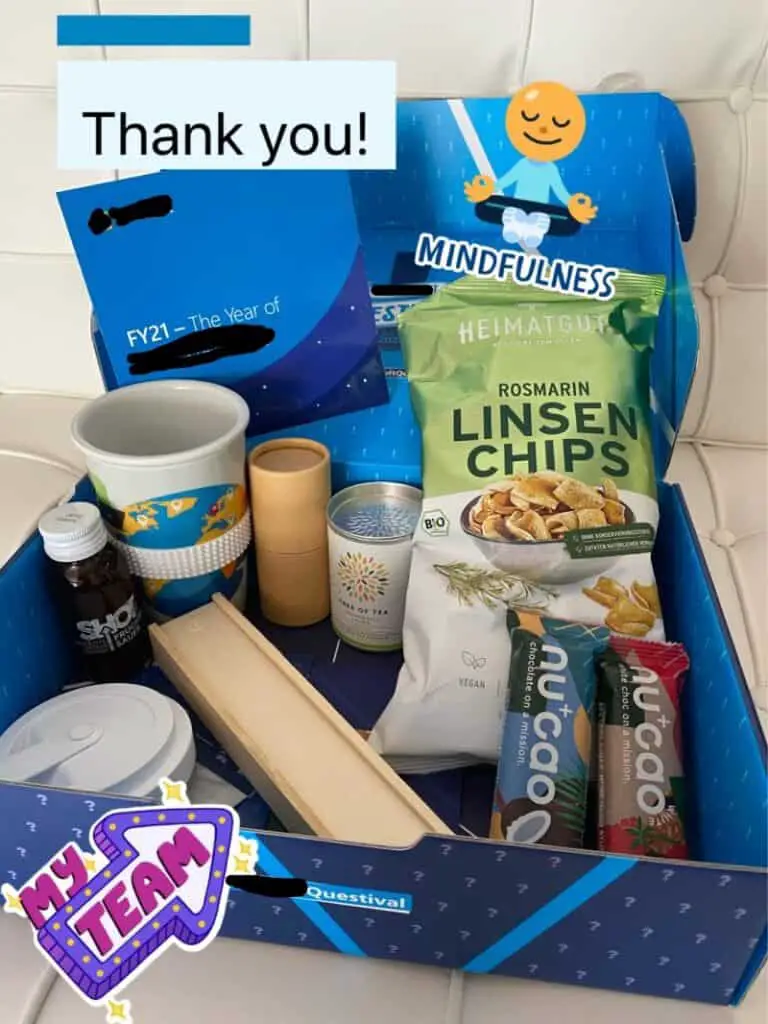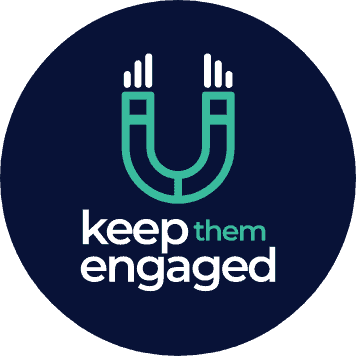Event companies report that they see an increase of 1000% in the number virtual events because of the Coronavirus pandemic, which is probably not a surprise for anyone since every in-person event has been cancelled.
Moving from in person events, with all its thrills, networking opportunities, open bars, and such, to basically watching TV in a business setting is difficult.
Especially since researchers are heavily discussing that the attention span of people is drastically declining, so organizations and event planners are sprinting to find ways to keep their attendees engaged with the content they produce.

This doesn’t even factor in all the interactions, conversations or meetings which were previously held in person but are now also completely virtual.
The need to make virtual events or any kind of other virtual experience a memorable experience or to simply keep an audience engaged is immense right now.
I have therefore compiled a list of ideas of how you could drive more audience engagement and create a more memorable experience for your attendees using gamification concepts.
Let’s dive in.
Make the Sign-Up Experience Memorable
Everyone who’s attended any kind of event probably knows the procedure. Once you’ve decided that you’re going to attend an event, and once you’ve purchased a ticket you might get an email from the event organizers to create a profile for the event with your basic information, usually information about the job you’re currently having and maybe even some interests of yours.
You’ll probably also see a huge table of different speakers and their respective time slots through which you have to go through to pick out the most interesting presentations. Pretty basic and normal procedure so far.
In an in-person event this might be okay since going to the event venue and reading up on all the speakers and stuff is just creating more hype. Especially if there are a lot options of different speakers and if the venue is just astonishing.
Well in a virtual event setting this entire process might be perceived as extra work and while it can be still fun to do, it might not create as much hype and excitement because the event is still “just” a virtual event.
Consider for example making a personal thank you video or display a short aftermovie from last year’s event to create more hype and excitement. One event which I will never forget to this day has put a lot of effort in creating these aftermovies:
The example video from TNW above was shot pre-corona, the next video showcases how they are tackling a virtual event set-up in 2020.
Now if I sign-up and see one of those videos I’m getting hyped and excited, even if the event is going to be virtual only – at least I get a feel for these amazing speakers.
And if I continue to get one of these videos for example as a reward for continuing the sign-up experience then chances are that I will fill out my entire profile.
Especially since the act of filling out your profile for people to start networking with you is so immensely essential in a virtual setting.
I mean in an in-person event you might simply walk up to someone and have a chat and he or she turns out to be an amazing connection to have for the future.
In a virtual setting this factor of randomness and chance just isn’t quite the same so it becomes essential for attendees to fill out their profile.
Now one idea could be to give out some kind of reward for filling out the profile, e.g. one more video as shown above, or once you filled out the entire profile you have some form of special status which gives you some specific rights, or you are invited to a specific virtual meeting with some famous speaker for example.
Another could be that you give the attendee a small discount coupon for next year’s event or early access to some kind of resource you’ve created. The list goes on, simply think of some kind of reward which your specific audience might find helpful or can help build up more hype.
Introduce Event Currency
One commonly used gamification element lays in using a form of digital currency. For an event you could consider having some form of event credits of which you have to distinguish between status credits or exchangeable credits.
Status credits are used for when you complete for example a step, such as filling out your profile, these credits are not exchangeable and are purely there to showcase the status, of an attendee.
If you give certain attendees, e.g. speakers a high initial status credit then you could for example showcase to other attendees that this particular attendee has a high value for the event and should be followed or taken seriously if he engages in a conversation.
Stackoverflow (a developer community website where people post coding questions) is for example quite successful with status points. They even differentiate between bronze, silver and gold status points which are given out based on how many people find a specific answer to a question useful:

On the other hand, exchangeable credits are used to be exchanged for items or something of value. They can be earned in an equivalent manner as status points, e.g. by engaging with the community and such.
In an in-person event participants could exchange these points usually for specific items, e.g. a coffee or I even received a massage once.
In a virtual setting you need to be a little more creative, you could consider investing in coupons for a Starbucks coffee for example or something similar. Which would give the attendee a good feeling plus he or she will be reminded of the event when they cash it in.
Remember when designing or incorporating event credits to first decide what the most important goal for your event is and then decide how for example certain activities are going to be awarded.
Make your attendees earn these credits properly so they value the credits, which should keep them more engaged.
Have a Shared Objective
Having some sort of shared objective is currently an immensely popular option to make events more engaging. Think of an escape room or a scavenger hunt, put that into a digital environment with certain challenges and you may have found a way for your attendees to bond and to stay engaged.
To give you an example, my last company event has been set up as a massive escape room with different levels. The hosts have been lured to the roof and have gotten stuck there (I know it’s a poor story line but they made it humoring).
The goal was to get together in small teams and find a way to reach them, so we can free them. Each level of our building was then a different puzzle to solve. Which can range from looking up certain facts on google to answering a few quizzes about our company values our provided products.
This particular event even included a delivery of a physical package prior to the event, with a paper puzzle. To solve the last levels, challenge you had to solve the physical puzzle and combine it with elements of the digital experience.
Despite it being virtual it was a lot of fun, plus it brought me closer to my colleagues and refreshed some of my memories regarding some company values.
Make Event Promotion Lucrative
Promoting an event is immensely important. You can of course use some Facebook ads or LinkedIn credits to start a marketing campaign but one of the best ways to promote an even is still by word of mouth or even when better, your attendees promote your event.
Based on the research from Jonah Berger, word of mouth is incredibly powerful in spreading news.
This basically comes down to trust. If one of my friends or connections promotes an event, then I generally trust this person to not recommend useless stuff.
Influencers are doing this regularly by promoting products on Instagram for example and are sharing a coupon which gives their audience a discount on said product. Usually every time someone uses that discount the influencer receives a small check as well (also called affiliate marketing).
In the case of event promotion consider doing something similar and give out for example some sort of awards or special prices. You could even start a “lottery” with all the promoters and the winner has the chance for a one on one with one of the speakers. Just to give you some ideas.
Reinforce Attendee Interactions (Comments/Likes)
To keep people engaged it is crucial that they feel that they can comment, like or ask questions during sessions. However, in many cases people won’t for example like another person’s comment or even comment or congratulate someone on an amazing performance for example.
The reasons can be anything from being to lazy, from being distracted on your phone or simply because the attendee doesn’t see the value in engaging.
Consider awarding attendees in leaving a comment or engaging in a life session for example. Even a simple like of another person’s comment could be awarded with for example exchangeable points or a different title next to the username.
If the goal is to keep them engaged with your content, then consider valuing and praising attended interactions.
Encourage Engagement and Networking During Breaks
Live and in person events are great and certainly needed to conduct business. When we look at the entire event from a position of when the most business is conducted or business cards and such are exchanged then that is usually during the breaks.
Which makes sense, the speaker just finished talking and people start to rush towards him to give him or her a business card for a follow-up for example during the time it breaks for the next speaker to set up their session.
The same goes for building meaningful connections. Just think back of any kind of event which included breaks, usually those are the times where people start having conversations which sometimes lead to great opportunities.
This exchange isn’t an option during online events. During breaks people simply leave because in many cases there simply isn’t a compelling reason to stick around.
The problem is that since the exchange of business cards or the networking aspects during breaks has now fallen through, event organizers and their attendees need to find a way to encourage that on the one hand attendees do not leave during breaks but rather try to engage with their fellow attendees.
To encourage that, you could offer that every interaction made during a break gives both chat participants a random bonus or rewards. Of course, this requires that you need to be able to track when messages are being sent.
This bonus can be anything a from random resource from the sponsors or a discount to the next event. What specifically that bonus or reward should be depends on what your event attendees might value the most.
Make Arriving on Time Lucrative
This is immensely frustrating in an in-person event since people come in late, which can disturb other attendees (ala “is that seat next to you taken”) or even distract the speaker in his presentation.
You’d think that since we moved to virtual that people would simply start at the time where they’re supposed so start. Well in my experience there is always the let’s wait two to three minutes for everyone to arrive – out of goodwill.
It’s a habit which is hard to erase. So, let’s try to reinforce and award behavior when someone is on time to encourage other attendees to be on time as well.
You could for example, every time you start a session display a simple passcode which gives the attendees some points or ones, they’ve come several times on time they get a specific title.
Simply start the session one or two minutes early and highlight the passcode which results in more satisfied presenters and happy attendees since they for once get rewarded for being on time.
Reward Looking at Content
Many events, big or small have educational content or simply content which is encouraged to look at. For example, an event sponsor would love that each attendee of the event would look at their resources.
Such as their biography the sponsor or if he represents a company it probably wouldn’t harm to get more eyeballs on the company’s website or their offered product page.
Now usually this is considered extra for an event attendee and, maybe it is just me but, I just never look at this stuff because while there might be some value – I usually think that it feels like an ad.
What if you gamify this experience by giving out prices or again credits for example if one of the event attendees has watched an informative resource or video from a sponsor.
Maybe even incorporate these sponsored resources as a part of a scavenger hunt or an escape room – with a hidden clue inside the content. This way your attendees might be more inclined to watch since there might be some real value in this.
Mix in Physical Clues
This is something I experience ones myself. In my organization we have one bigger company event in which every employee is encouraged to participate.
Because of corona the last event was held virtual. Prior to the event every employee would receive a package via post, containing some company merch, some tea and snacks to keep us “fed” during the all-day event.
We also received a couple of physical clues, depending on the team every employee received a different clue one. Which means that the team members had to work together and interact to solve a concrete problem.

This was immensely fun, especially since this created hype and excitement for the event itself even though it was virtual.
Consider some form of physical product which is needed to interact with something during the event. The product doesn’t have to be big either just a simple letter with a passcode or a riddle could help engage attendees.
Make the Learning Experience More Fun
This is for example relevant if you’ve built your own event page or application and you feel the need to illustrate how to use the service you’ve created.
There is nothing more boring than one more intro video of how to click around in an app or webpage. Consider making the experience more fun by inserting some kind of story or time pressure of completing the learning path, otherwise the attendee will lose e.g. credit points and such.
Set Up Exclusive Access Groups
Many physical events have these VIP areas where speakers, sponsors or special guests can spend time together and network.
Consider having something similar in a virtual event where people receive a special invite to sessions or discussions based on their status or the number of credits associated with their profile.
It can go even further by making it possible that only people with a specific status are allowed to ask questions and such during speaker presentations.
How an attendee receives exclusive access is up to you but consider making it somehow available with a certain threshold of e.g. status points, which will encourage attendees to work for receiving this privilege.
Use Ice-Breaker Games to Encourage Networking
Getting to know your fellow attendees in an online event isn’t nearly as fun as in-person, at least in my opinion. However, it is still crucial that your attendees are able to network and interact among themselves.
This is where a couple of ice-breaker games might help, as long as they’re not to childish! Simple games, which help attendees to get to know each other are already enough.
By that I mean games like telling two truths and one lie or asking a set of questions such as what’s your favorite home office dress code and such are a simple way for attendees to get to know each other quickly.
You can find a list of ice breaker questions here.
